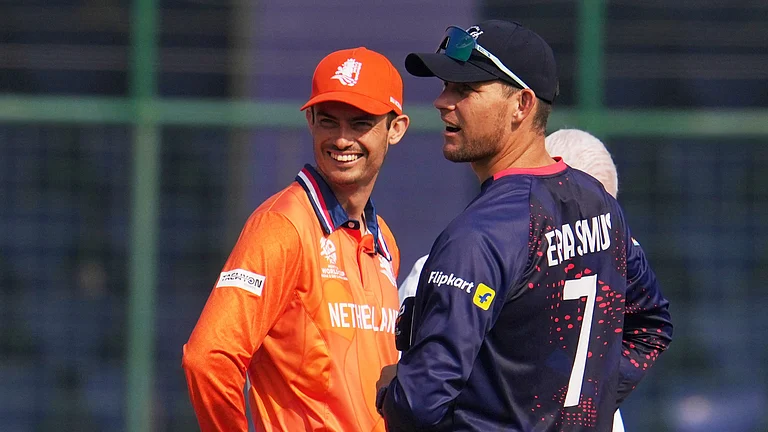A world of Empire. Of Voltaire, Schubert and Turner. Of aristocrats and nobility. Of bowler hats and bus queues. A world that disappeared half a century ago, but continues to exist in the mind and abode of Nirad babu at Oxford. A world that is bereft of most modern and post-modern influences.
He has gone to great lengths to preserve the sanctity of his island of excellence in what he considers a sea of decadence, depravation and decline. Screening callers and visitors and leading an insular life, the only intrusion he has allowed into the fortress of a bygone era is television. And that has only helped strengthen his conviction of the decline of the West and the rise of mediocrity.
Not surprising then that when he turned 98 on November 23 this year—possibly making him the world's oldest writer in the English language (100-year-old German author Ernst Junger is probably the oldest), the world did not celebrate with him. In fact, the event passed by virtually unnoticed. The only official felicitation was conducted by the director of the London-based Nehru Centre.
And herein lies the tragedy, for Nirad Chaudhuri is probably one of contemporary India's greatest men of letters. He is perhaps the last of the intellectuals in the 18th and 19th century mould, where writing and intellectual pursuits were regarded as leisure activities rather than an occupation. This, according to Sudipto Kaviraj, professor of politics at the School of Oriental and African Studies, London, andardent critic of Chaudhuri, imparted a sense of freedom and great individuality to a non-academic style of writing which was more literary in its approach. Thus, he is reviled and revered in equal measure: reviled by those who see him as a reactionary, right-wing commentator on Indian history and revered by those who marvel at the breadth of his learning, his mastery of language and the brutal frankness with which he conveys his message. But there is no doubt that he is a chronicler par excellence of this turbulent century.
Born in 1897 in the small town of Kishorganj in present-day Bangladesh, heshot to fame at the age of 50 with the publication of The Autobiography of an Unknown Indian. Some 20 years later, he migrated to the UK, took up residence at Oxford and continued his prolific writing career.
The highlight of his years in Oxford was the award of an honorary D. Litt degree from the university, which in many ways was ironical, considering that Chaudhuri had failed his MA. During the ceremony, the address on the occasion was given not in the traditional Latin, but in Bengali. For days after the ceremony, recall friends, Chaudhuri would greet visitors in his newly acquired academic regalia.
In 1986, at the age of 89, he completed the second part of his autobiography, Thy Hand Great Anarch . What makes these two volumes unique is their combination of the history of the individual and the history of the country. In fact, philosophy professor and personal friend Margaret Chatterjee describes him as "a spokesman for the century, especially about the history of united India and undivided Bengal".
However, as Chaudhuri himself admits, he is not content with being a mere recorder of events and has never been "carried away by the currents of history", but has "navigated through them". Thus, in these two volumes he propounds the thesis that the history of India in the 20th century is one of decline—moral, economic and political. Not surprisingly, this never made him a favourite of the Indian establishment.
But if Chaudhuri was disillusioned with India, he quickly grew equally disenchanted with the West. Having first visited England and Europe in 1955, a trip he considered as the "most exciting and interesting" time in his life, he was dismayed to see his ideal crumble before his very eyes when he moved here permanently in the '70s. Says Ian Jack, editor of
Granta and survivor of several rounds of Chaudhuri inquisitions: "He had fallen in love with western culture which let him down both in its quantity and strength. This is really touching and true about us."
Consequently, while the West remains deaf to Chaudhuri's lament, the angry, solitary, old man (now deprived of the unflinching support of his wife of 60 years, Amiya, who passed away a year ago) is working on what he hopes will be a defini-tive book on the decay of the West.
Moreover, Chaudhuri also took upon himself the unpopular role of an iconoclast and targeted Bengali culture's best known icon: Tagore. (He writes regularly in Bengali for the monthly Desh .) While Chaudhuri's critical appraisal of Tagore is commendable, he has been unable to elevate it to any significant academic height. So much so that while even Kaviraj welcomes his iconoclast attitude as healthy, he feels it is not reflec-ted in his writing.
One indication of this is that Chaudhuri has failed to spawn a distinctive school of followers. This is probably because he did not want to put himself out as a model and was not sufficiently consistent in his views. His tragedy is that despite being a deft chronicler and a crucial witness to an epoch-making century, he will probably be remembered as a man of some curiosity who didn't write to impart information but to display it.
And while he labours on, he depends on the support of the very state that he has set out to attack. A neighbour comes by twice a day to look him up. Chaudhuri describes the routine laconically: "Every morning at 8.15 the woman from next door comes to check that I am not dead in my bed, and returns in the evening to check that I am not dead elsewhere in the house." Soon after the visit, breakfast is served by hired help, who also prepares the other meals for the day. This help is possible due to the support from the local authority and his government pension. Chaudhuri warms up his lunch and dinner himself. Occasionally he cooks the odd dish.
He spends the morning hammering away at his laptop (or writing in Bengali), before setting down with his favourite books or music, both Indian and western classical. He is also fond of Rabindra Sangeet. If the weather is agreeable, he spruces himself up and goes for a brisk walk, mostly to run errands, such as post letters or do some shopping. After lunch he rests for a couple of hours before returning to either his books or music. He also watches television with growing dismay. He expressed his disillusionment with the BBC to Ian Jack: "Pride and Prejudice. They have ruined it!"
He does have a close group of friends who call on him once or twice during the week. Among them is renowned Oxford don Tapan Ray Chaudhary. And visitors from India passing through also make it a point to meet Nirad babu. Of his three sons, Dhruva, who lives in Delhi, keeps in touch and visits regularly. Otherwise it's a rather solitary existence for this sparrow-like man in his carefully cultivated nest.


























